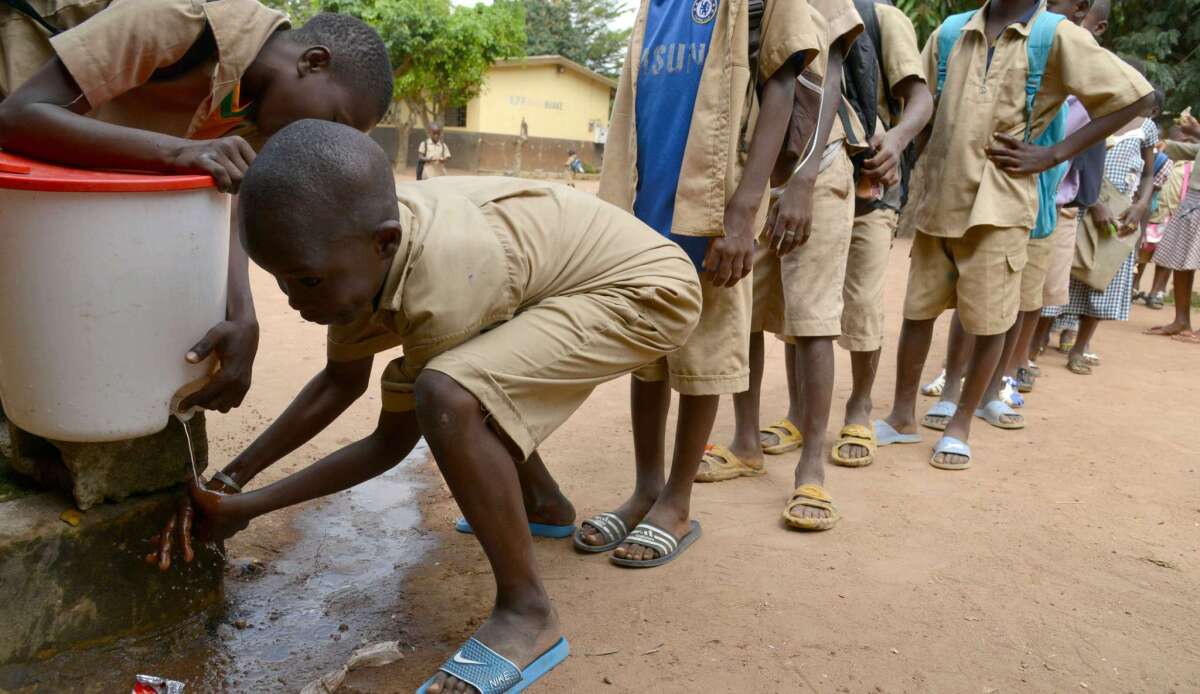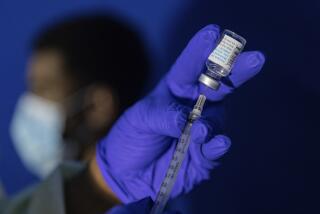Mali monitors 43 people as it tackles its first case of Ebola

- Share via
Reporting from Johannesburg, South Africa — Health authorities in Mali are monitoring 43 people known to have been in contact with a 2-year-old girl, the West African nation’s first Ebola case.
As Malian officials scrambled to head off the threat, authorities in neighboring Ivory Coast were hunting for a Guinean health worker believed to have fled his country, possibly carrying the disease.
The 2-year-old girl, who was not identified, was brought by her grandmother to relatives in the Mali town of Kayes after the child’s mother died of Ebola in Guinea. On the way, she spent 10 days in the neighborhood of Bagadadji. Ten health workers who treated the child are among the 43 being observed, according to the World Health Organization.
“As soon as the case was confirmed, local authorities began tracing everyone who had contact with the little girl and her grandmother,” said WHO spokeswoman Fadela Chaib at a Geneva news conference Friday.
“She saw a healthcare worker on Oct. 20 when she had a fever of 39 degrees Celsius [102 degrees Fahrenheit], blood in her stools, was coughing and had a nosebleed,” Chaib said. “They tested for malaria or typhoid and she was admitted to hospital on Oct. 21.”
She said four additional WHO experts would be sent to Mali, in addition to three presently in the country, to ensure the virus does not spread.
Malian Health Minister Ousmane Kone said on state television that the 2-year-old, who traveled from Kissidougou, Guinea, had been brought for treatment soon after exhibiting symptoms and her condition was improving.
Mali became the sixth West African country to record an Ebola case, with most of the cases in Liberia, Sierra Leone and Guinea, where infections are still rising exponentially. In Ivory Coast, where there have been no cases yet, authorities launched a search for a Guinean health worker who might be carrying the virus and is believed to have left his homeland.
An official with Ivory Coast’s National Public Health Institute, Daouda Coulibaly, confirmed the hunt for the Guinean health worker. But he told the Agence France-Presse news service that the man was not believed to be contagious. He said the man fled into Ivory Coast from an area of Guinea where Ebola is rampant after treating a patient suspected of having the disease in a clinic. The patient later died.
The virus continues to outstrip efforts to control it in Liberia, Sierra Leone and Guinea, where there’s a shortage of treatment beds and burial teams, so that people with the highly contagious disease remain in the community, infecting family members, before dying of the disease.
Cases numbers continue to climb rapidly, with 976 of the nearly 10,000 Ebola cases occurring in the last seven days.
And a new study published in the medical journal Lancet warned that Ebola could kill 90,000 people in Liberia by mid-December unless efforts to contain the disease were stepped up.
A member of the study team, Alison Galvani, said in a statement Friday that there was a limited window to get the disease under control and avert a catastrophic death toll. Extra treatment beds, improved detection of new cases and household kits to help families deal with sick people at home were all desperately needed, according to the study, based on research in Montserrado county, Liberia’s most populous district.
West Africa needs an additional 20,000 contact tracers, 230 burial teams and nearly 4,400 treatment beds before the virus can be contained, according to the WHO.
Meanwhile, the WHO announced in Geneva that it was hoping to see over 1 million doses of Ebola vaccine available next year. At the moment, with no cure, 70% of people with Ebola in West Africa die.
Marie-Paule Kieny of the WHO told journalists in Geneva on Friday that several hundred thousand doses could be available by mid-2015, with two vaccines undergoing human trials and five more in development. She spoke after a meeting with drug industry leaders, government regulators and health experts, Reuters news service reported.
The disease originated in Guinea in December and spread quickly throughout the region, partly because of the highly mobile population and high degree of cross-border trade in the area.
Many families have relatives in different West African countries, and traders or people visiting neighboring nations for relatives’ funerals quickly spread the virus, which has killed close to 4,900 people in Africa. The real number of cases could be three times higher than the estimate of nearly 10,000, according to the WHO.
The European Union on Friday boosted aid to combat Ebola from $505 million to $1.26 billion.
Nigeria’s acting health minister, Khaliru Alhassan, said Friday that the West African powerhouse, the continent’s biggest economy, was ready to send 600 health workers to the worst affected countries to help treat Ebola patients, Reuters reported. In addition, African Union chief Nkosazana Dlamini-Zuma said an additional 600 health workers would be sent to the worst affected countries from East Africa.
Swift contact tracing in Nigeria prevented the spread of the virus there after a sick man flew to Lagos from Liberia. Senegal recorded one case. Both countries were recently declared Ebola free by the WHO.
The WHO has urged countries with Ebola cases to strengthen public information to reduce stigma, panic, misinformation and disproportionate responses to the disease, which it warned could discourage people with symptoms from seeking treatment.
Dr. Keiji Fukuda of the WHO said Thursday that the organization hoped to see a “bend in the curve” — bringing more cases under control and slowing new infections — by December. He said the organization was confident there was no widespread transmission in other West African countries beyond Liberia, Sierra Leone and Guinea.
“I think that there is reasonable confidence right now that we are not seeing widespread transmission of Ebola into the neighboring countries,” he said.
Follow @robyndixon_LAT on Twitter for the latest news out of Africa
More to Read
Sign up for Essential California
The most important California stories and recommendations in your inbox every morning.
You may occasionally receive promotional content from the Los Angeles Times.













